White-Capped Pionus: Breed Species Profile
White-capped pionus parrots are beautiful, curious, intelligent birds that can make excellent pets for the right people. However, not everyone is well suited to care for one of these birds, especially considering that they can live for 30 years or more. The smallest of the eight pionus species, it is feisty for a pionus, but still laid back compared to other parrots, like Amazons, macaws, or cockatoos.
Species Overview
Common Names: White-capped pionus, white-cap pionus, white-crowned pionus, white-crowned parrot
Scientific Name: Pionus seniors
Adult Size: 9 to 10 inches, head to tail; weighing between 7 and 8 ounces
Life Expectancy: 30 years
Origin and History
The white-capped pionus is native to the forests and woodlands of Central America and Mexico. Usually, they live in forests and dense growth, nesting in hollow tree trunks and palms. Found in flocks of about one dozen birds, these are mostly silent and peaceful creatures.
Temperament
White-capped pionus are known to be feisty and comical, as well as sweet, affectionate little birds. They are brilliant and take well to training when their owners are patient and consistent. These parrots thrive when given social interaction and mental stimulation from playing and learning tricks.
These birds tend to get shy around strangers. Around their owners, they like to hang out on their shoulders or arms, dancing, playing, and waiting for a chance to make a game out of stealing items like pens or buttons. They tend to get attached to a single person whom they trust the most.
You will have to keep a close eye on this bird when it is out of the cage. It has a notoriously curious nature and can get into trouble if not closely supervised.
Speech and Vocalizations
Like other pionus parrots, the white-capped birds have a reputation for being slightly quieter than other hookbill parrots and make a great apartment bird. However, a houseful of screaming children, barking dogs, and blaring televisions can easily teach the sedate pionus to be noisy.
They do have the ability to talk, but often clam up around those they aren't familiar with. Pionus are not the best talkers, but some have an impressive vocabulary. Their speaking voice isn’t always crystal clear and is often a little raspy, but an owner can generally make out what their bird is saying. Usually, they will learn a few simple words like their name, the name of people in the house, and will repeat more common sounds like whistles, whispers, beeps, and animal sounds.
White-Capped Pionus Colors and Markings
Compared to adults, juvenile white-capped pionus are dull and dingy looking. As young birds, this feature helps keep them camouflaged from predators in the wild.
Like the name suggests, the top of their head is pure white with another little white spot under their chin. Mature adult white-capped pionus are mostly green and dark blue. These colors cover the majority of their head, throat, chest, belly, and back. It has yellow-green patches on their shoulders, and as with all pionus, red feathers on the underside of their tails.
The white-capped pionus is a monomorphic species, meaning it is impossible to tell males from the females based on looks alone. This bird requires a genetics test or a surgical sexing procedure to determine sex.
Caring for the White-Capped Pionus
Cages used to house Amazons are suitable for white-capped pionus parrots. Consider a cage that is at least 4 feet tall and 4 feet long by 2 feet wide. Bar spacing should be no larger than 3/4-inch.
Pionus parrots might make a wheezing sound when frightened or excited, which an owner might mistake for a medical condition. Pionus also give off a musky or sweet odor that some caretakers find unpleasant, but others like.
Ensure they get a bath regularly, and don’t hesitate to take them with you in the shower.
Common Health Problems
Pionus parrots are susceptible to fungal infections, visceral gout (a kidney infection), and aspergillosis, which is indicated by heavy, difficult breathing. They may also be prone to vitamin A deficiency.
Diet and Nutrition
In the wild, pionus parrots eat fruits, berries, seeds, blossoms, and corn. In captivity, white-capped pionus should be fed a high-quality seed and pellet mix, along with a variety of fresh foods like bird-safe fruits and vegetables. White-capped pionus love eating corn, particularly corn on the cob, so make sure to make it a regular snack for these lovely birds.
Occupying your bird with new foods is not only nutritionally beneficial, but it also offers essential mental stimulation for your feathered friend. You can give them an unlimited amount of pellet food; they will only eat what they need. As for fresh fruits and veggies, offer about a 1/8 to 1/4 cup in the morning and at night.
Exercise
All pionus parrots are active birds and need 3 to 4 hours of exercise outside of the cage every day to stay healthy. If you cannot provide outside-of-cage time, this bird will need a massive cage or aviary to get ample exercise.
This exercise should occur in a safe, bird-proofed area with windows closed, ceiling fans turned off, and other indoor animals removed. Supervise playtime to make sure that your bird does not get into anything that could be toxic or otherwise harmful. A playpen is ideal for outside-of-cage play. Playthings can include climbing ropes, chains, bells, parrot swings, and wooden or other bird toys.
Social and friendly
Intelligent, can say a few words and can learn tricks
Quieter species of parrot
Not a fan of strangers; tends to be a one-person bird
Requires at least 3 to 4 hours of outside-of-cage exercise
Where to Adopt or Buy a White-capped Pionus
Before bringing this bird home, visit with local bird breeders or an aviculture society in your area. Speak to people who have experience raising these birds. Observe the birds and learn firsthand what it's like to live with a white-capped pionus on a day-to-day basis. White-capped pionus are typically available from bird breeders and some avian specialty stores. They are occasionally available from avian rescue organizations. These birds can cost about $400 to $900. Some adoptions or rescues that may have white-capped pionus include:
- Birds Now
- Adopt a Pet
- Hoobly
If you're going the breeder route, make sure that the breeder is reputable by asking them how long they've been breeding white-capped pionus parrots. Carefully inspect a bird before taking it home. A healthy bird is alert, active, has bright eyes, clean feathers, and full crops.
More Pet Bird Species and Further Research
If you’re interested in similar species, check out:
- Sun Conure Species Profile
- Pacific Parrotlet Species Profile
- White-Fronted Amazon Species Profile
Otherwise, check out all of our other small parrot species profiles.
RECOMMENDED NEWS
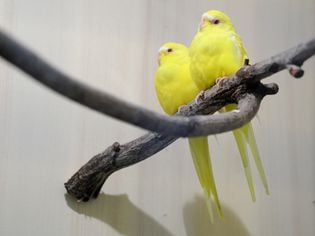
Lutino Parakeet: Bird Species Profile
The lutino is a type of parakeet that belongs to the parrot family. These intelligent and affection...
Read More →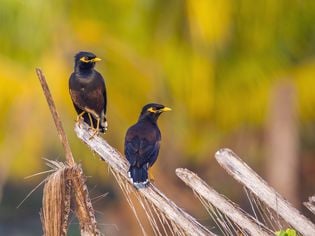
Mynah Bird: Bird Species Profile
If you want a chatty, intelligent bird to share your home, then the tropical mynah bird is the pet ...
Read More →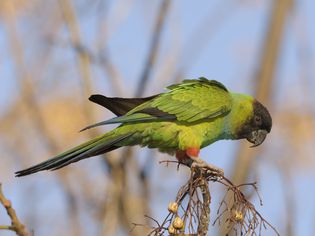
Black-Hooded Parakeet (Nanday Conure): Bird Species Profile
The nanday parakeet (formerly called black-hooded parakeet) is not a quiet bird, but it is a popula...
Read More →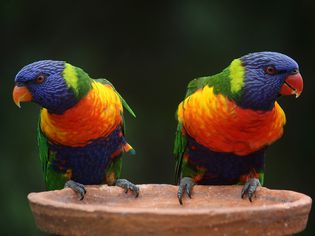
Rainbow Lorikeets: Species Characteristics & Care
Sweet-natured, vibrantly brilliant rainbow lorikeets are long-lived, medium-sized parrots that grow...
Read More →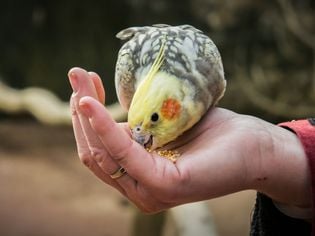
How to Help Your Bird Gain Weight
There are several things that you can do to help a bird gain weight, but the very first thing that ...
Read More →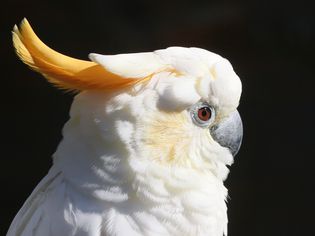
Citron-Crested Cockatoo: Bird Species Profile
The citron cockatoo is a slightly smaller, quieter, and more subdued variety of the sulphur-crested...
Read More →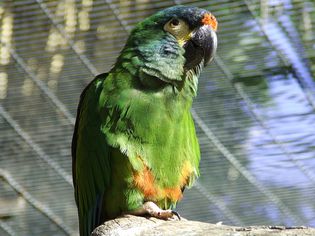
Illiger's Macaw (Blue-Winged Macaw): Bird Species Profile
Beautiful, playful, and charming, the Illiger's macaw has grown in popularity as an easily trainabl...
Read More →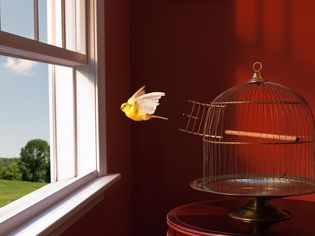
Retrieving Pet Birds That Escape the Home
For most pet bird owners, the thought of their bird flying away is their worst nightmare. If a...
Read More →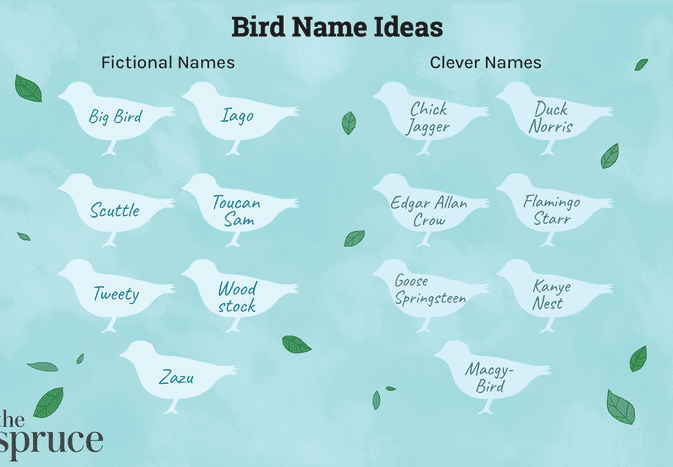
355 Bird Names For Your Feathered Friend
Bird names for your feathered pets vary depending on their personality, traits, and characteristics...
Read More →
Comments on "White-Capped Pionus: Breed Species Profile" :